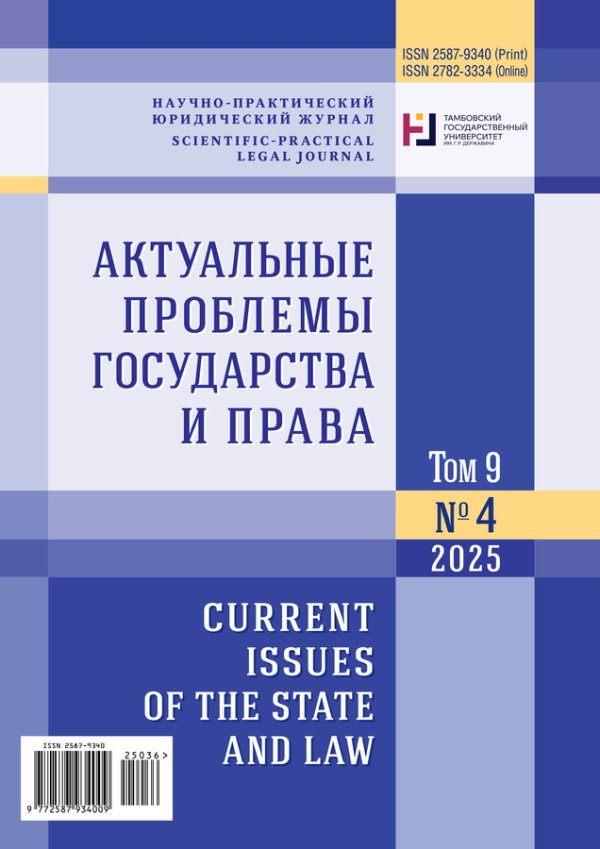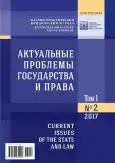Том 1, № 2 (2017)
- Год: 2017
- Выпуск опубликован: 25.11.2017
- Статей: 15
- URL: https://bakhtiniada.ru/2587-9340/issue/view/19509
Весь выпуск
Общая теория и история права и государства
ПУБЛИЧНЫЙ ИНТЕРЕС КАК ПРАВОВАЯ КАТЕГОРИЯ
Аннотация
 6-13
6-13


ДЕЯТЕЛЬНОСТЬ СПЕЦИАЛИЗИРОВАННЫХ ПЕРИОДИЧЕСКИХ ПРАВОВЫХ ИЗДАНИЙ И РАЗВИТИЕ КОНСТИТУЦИОННО-ПРАВОВОЙ МЫСЛИ В РОССИЙСКОЙ ИМПЕРИИ НА ПРИМЕРЕ ЕЖЕНЕДЕЛЬНОЙ ЮРИДИЧЕСКОЙ ГАЗЕТЫ «ПРАВО»
Аннотация
 14-23
14-23


Материальное право
К ВОПРОСУ О ПРОБЛЕМАХ КВАЛИФИКАЦИИ РАЗВРАТНЫХ ДЕЙСТВИЙ (статья 135 Уголовного кодекса Российской Федерации)
Аннотация
 24-30
24-30


ПРАВОНАРУШЕНИЯ В БАНКОВСКОЙ СФЕРЕ И ВОПРОСЫ СОВЕРШЕНСТВОВАНИЯ ОРГАНИЗАЦИОННО-ПРАВОВОГО РЕГУЛИРОВАНИЯ
Аннотация
 31-39
31-39


МОШЕННИЧЕСТВО В СФЕРЕ ПРЕДПРИНИМАТЕЛЬСКОЙ ДЕЯТЕЛЬНОСТИ: РЕДАКЦИЯ НОВАЯ, ПРОБЛЕМЫ СТАРЫЕ?
Аннотация
 40-50
40-50


ОФИЦИАЛЬНЫЕ ИЗВИНЕНИЯ ПРОКУРОРА РЕАБИЛИТИРОВАННОМУ КАК ВИД ВОЗМЕЩЕНИЯ МОРАЛЬНОГО ВРЕДА: ПРОБЛЕМНЫЕ АСПЕКТЫ
Аннотация
 51-59
51-59


РАЗВИТИЕ УГОЛОВНОГО ЗАКОНОДАТЕЛЬСТВА ОБ ОТВЕТСТВЕННОСТИ ЗА ПРЕСТУПЛЕНИЯ В ОБЛАСТИ ТРАНСПОРТНОЙ БЕЗОПАСНОСТИ В ДОРЕВОЛЮЦИОННЫЙ И СОВЕТСКИЙ ПЕРИОДЫ
Аннотация
 60-73
60-73


Процессуальное право
ВАРИАТИВНОСТЬ ИСПОЛНИМОСТИ СУДЕБНЫХ РЕШЕНИЙ
Аннотация
 74-85
74-85


АКТИВНАЯ РОЛЬ СУДА КАК ГАРАНТИЯ СОБЛЮДЕНИЯ ПРИНЦИПА СПРАВЕДЛИВОСТИ В АДМИНИСТРАТИВНОМ СУДОПРОИЗВОДСТВЕ
Аннотация
 86-97
86-97


ОСОБЕННОСТИ РАССЛЕДОВАНИЯ ДОЛЖНОСТНЫХ ПРЕСТУПЛЕНИЙ
Аннотация
 98-106
98-106


Национальная безопасность
ПРАВОВАЯ ОТВЕТСТВЕННОСТЬ ЗА ОБЩЕСТВЕННО ОПАСНЫЕ АУДИАЛЬНЫЕ ИНФОРМАЦИОННО-ПСИХОЛОГИЧЕСКИЕ ВОЗДЕЙСТВИЯ
Аннотация
 107-114
107-114


Стратегия экономической безопасности до 2030 г.: теоретико-правовой анализ
Аннотация
 115-124
115-124


Право в системе социальных наук
ЛОББИРОВАНИЕ КАК ИНСТРУМЕНТ СОГЛАСОВАНИЯ СОЦИАЛЬНЫХ ИНТЕРЕСОВ: К ВОПРОСУ О ПЕРСПЕКТИВАХ ПРАВОВОГО РЕГУЛИРОВАНИЯ
Аннотация
 125-135
125-135


Юридическое сообщество
ОБЗОР «КРУГЛОГО СТОЛА» «ИНСТИТУЦИОНАЛЬНЫЕ, ТЕХНОЛОГИЧЕСКИЕ И ПРАВОВЫЕ ОСНОВЫ УСТОЙЧИВОГО РАЗВИТИЯ» (13 октября 2017 г., г. Тамбов)
Аннотация
 136-141
136-141


ОБЗОР НАУЧНОГО «КРУГЛОГО СТОЛА» «ГОСУДАРСТВЕННО-ПРАВОВАЯ ПОЛИТИКА СОВРЕМЕННОЙ РОССИИ В СФЕРЕ НАКАЗАНИЙ: ПРОБЛЕМЫ ТЕОРИИ И ПРАКТИКИ» (25 октября 2017 г., г. Тамбов)
Аннотация
 142-148
142-148










